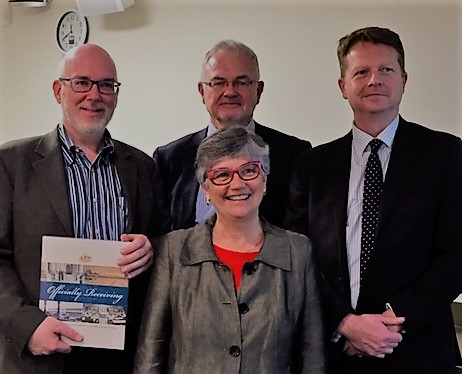Bankruptcy in Canada in the 1930s

Articles on this website generally attract reduced readership if they are about bankruptcy rather than liquidation; or if they are about overseas law rather than local; or if they go into history, rather than the present. This article covers all three – nevertheless an interesting paper[1] on the history of Canadian bankruptcy law in the […]
Insolvency law – assets and liabilities, activities and affairs – ASIC and AFSA

ASIC has released its new Report On Company Activities and Property (ROCAP), said to have been the result of an ‘extensive revision process and industry consultation conducted through an external consultant’. This is the report as to company’s affairs referred to in s 475 of the Corporations Act, and other sections, required of company directors. […]
ASIC’s liquidator regulation activities – 2017-2018

Under s 136(1)(ca) of the ASIC Act, ASIC is required to report in its annual report on its activities under Chapter 5 and Schedule 2 of the Corporations Act, and the exercise of its information gathering powers, among other activities. Although not designated under s 136, here are some insolvency comments and figures from ASIC’s […]
Debtors’ breathing spaces – UK reforms

This UK government consultation concerns new arrangements proposed for a 60 day ‘breathing space’ for struggling debtors, and for a separate statutory ‘debt repayment plan’. The proposals focus on debtors not covered by existing bankruptcy and other alternative arrangements in the UK. Debtors must take advice from registered debt advisers, with insolvency practitioners not necessarily […]
The elephant in the room of SMEs

It now seems that an old elephant in the room – about the misconduct of banks and financial institutions – has been revealed by the Hayne Royal Commission. Bleak as my comment may be, I suspect that if a Hayne were to inquire into many areas of business in Australia he would find the same […]
UK Crown priority in insolvencies to be restored

The UK government has announced in its 2018 budget that priority dividend payments will be made to the revenue for certain unpaid taxes of a company in insolvency – including VAT and PAYE. This will apply from 6 April 2020. The announcement rather cutely states that these taxes “do not always get paid if the […]
Law reform obituary – CAMAC 1983-2018

The Corporations and Markets Advisory Committee (CAMAC) was a corporate law reform body comprising individuals eminent in that field. It was created in 1983 and belatedly abolished in 2018,[1] although it had not operated since 2014. The reasons for its abolition were to do with ‘smaller government’. Professor Ian Ramsay, a former long-term member of […]
‘Criminal Law fit for a continent? I don’t think so’.

The Australian Academy of Law is presenting this session hosted by Curtin University Law School on 8 November 2018 in Perth, at 5.30pm, presented by Professor Paul Fairall. As he explains, ‘Australia has a population of 24m with 9 distinct State or Territory criminal law jurisdictions and a rapidly expanding body of federal criminal law […]
Mis’conduct proceedings based on evidence reported in the media’

ARITA advises that it can now ‘begin conduct proceedings [against its members] based on evidence reported in the media’. Murrays Legal only reports matters substantiated in court, government, academic or other such sources. In any event, whether that be ‘evidence’ is another matter. While we receive much lesser ‘popular media’ type information about people and […]
Insolvency remuneration – time-charging, or better?

Lawyers’ fees in class actions were the subject of a recent conference[1] paper by Sir Rupert Jackson, given in Melbourne, whose report in the UK has led to major costs budgeting reforms in the way lawyers must justify their fees. An Australian costs expert has extended this thinking to explain the need for insolvency professionals […]
Voluntary administrations and the benefits, or otherwise, of board turnover

Research just published[1] has looked at the relation between board turnover and the likelihood that a company that enters a deed of company arrangement under Part 5.3A of the Corporations Act produces a better outcome for creditors than a liquidation. Controversially, the research questions the long-held view that voluntary administration (VA) under Part 5.3A is […]
Litigation funding – ASIC’s submission to the ALRC

ASIC’s submission[1] to the Australian Law Reform Commission on class actions and litigation funding seemed to be a surprise to some.[2] ASIC says that, consistent with other jurisdictions, litigation funding should be regulated as a legal service, under the control of the courts, rather than as a financial service, regulated by ASIC or other appropriate […]
Senate inquiry into unlicensed debt managers, credit repairers and payday lenders

The Senate Committee inquiry into debt management firms comes at an odd time, given pending regulation of such services by the new Australian Financial Complaints Authority, from 1 November 2018. The concern about debt advisers has been around for some time, including in England and Canada. The Senate Standing Committee on Economics is inquiring into […]
ASIC’s new insolvency ‘ROCAP’ – the Report On Company Activities and Property

The long history of the report as to affairs in corporate insolvency – the RATA – which started about 1890, has now ended, in 2018. ASIC has replaced the RATA with a ROCAP – Report On Company Activities and Property – which must be prepared and lodged with ASIC by directors of a company that […]
NSW Registered Clubs – insolvency law change required

Registered clubs all over the country get into financial trouble, sometimes requiring the formal insolvency processes under the Corporations Act to secure their position, and potential recovery, and often urgently. Only in NSW is there a barrier to promptly accessing those processes. A recent article by Nicola Cosgrove and David Turner has repeated earlier calls […]
Competing with phoenix operators, rather than combatting – a goverment liquidator

The World Bank has come out with reports[1] that support the Australian government’s attempts to control unlawful phoenix activity, by way of the creation of a government liquidator to handle a new streamlined process for handling the insolvencies of micro-small-to-medium size enterprises (MSMEs), the source of much phoenix activity. The reports sensibly examine personal and […]
ASIC’s 2018 annual report – insolvency, what to expect

An interesting aspect of ASIC’s forthcoming 2018 annual report will be its review of the operation of the changes brought in by the Insolvency Law Reform Act 2016 (ILRA), in particular those in Schedule 2 to the Act. Under s 136 of the ASIC Act, that annual report must include “information about the activities that […]
Too poor to be made bankrupt?

Most bankruptcies pay nothing to unsecured creditors. But there are only limited circumstances where a debtor can resist bankruptcy by claiming that they have nothing. Creditors that do petition the court to make a person bankrupt may often have some particular focus on assets transferred or undisclosed; but even then, that creditor has to share […]
Places of open debate or ‘echo chambers of orthodox creeds’
The need for universities to maintain and encourage open debate, particularly in matters of controversy, was recently the subject of a talk for the Academy of Law by Robert French, Australia’s former Chief Justice.[1] The topic has wider relevance, including to the professions. Austin Asche Oration, Free Speech and the Law on Campus 17.9.2018 (3) […]
Unclaimed moneys in bankruptcies – the law reformed

Those who are owed “unclaimed moneys” arising from a bankruptcy – for example a creditor whose dividend payment went astray – are assisted by recent changes to a section of the Bankruptcy Act that dates back to the 1924 Act and before. What has been a long-standing injustice is being belatedly remedied by the Bankruptcy […]
The bankruptcy of Lehman Bros – a mere coincidence

Ten years ago, on 15 September 2008, Professor Rosalind Mason of QUT Brisbane and I gave a paper at the INSOL Academics Group Meeting in Shanghai, China, entitled Issues surrounding recognition and enforcement of multistate bank and insurance company insolvencies. On that very day, Lehman Brothers entered bankruptcy, prompting a complex and long-running multistate bank […]
NZ Insolvency Practitioners Bill – RITANZ submission

The submission of RITANZ of 7 September 2018 on the proposed Insolvency Practitioners Bill presently before the NZ parliament raises a number of issues of interest to Australia’s practitioners and its insolvency laws. RITANZ RITANZ is a professional industry body with over 450 members throughout New Zealand, of which approximately 100 members have been granted […]
Ordinary course of post – now 7 days not 4

Section 160 of the Commonwealth Evidence Act 1995 has been amended to change the day when posted letters are presumed to be delivered “in the ordinary course of post”. The Civil Law and Justice Legislation Amendment Act 2018 changes the presumed timing of delivery from the fourth to the seventh business day after posting. That is significant […]
International cross-border insolvency – an Australian diary

Some selected diary items of interest to Australian readers, and others. September 2018 QUT Law – Dr Paul Omar – Regulation of Insolvency and Insolvency Practitioners in the Asia-Pacific Region QUT is hosting an exclusive round table on insolvency systems and the regulation of insolvency practitioners from diverse economies in the Asia-Pacific Region, with […]

